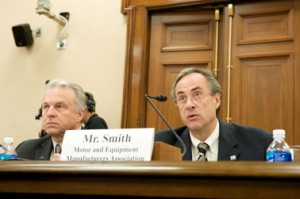
The president of E&E Manufacturing, Wes Smith, explains to the House Small Business Committee the negative effects of the crisis on small suppliers.
The Original Equipment Suppliers Association (OESA) has submitted a plan to the U.S. Department of the Treasury that outlines “immediate actions” needed to stabilize the increasingly deteriorating situation in the country’s auto supply base. OESA points to 49 supplier insolvencies in 2009, and predicts an additional 60 supplier insolvencies in 2010 if the current situation prevails.
“The supplier industry is witnessing a very rapid and dangerous decline,” said Neil De Koker, OESA president. “Further losses would exacerbate the devastation within the supplier industry, threaten the ability to support a domestic vehicle manufacturing industry, and worsen the economic conditions in communities across the country.”
The trade group cites a continued lack of available credit, severely reduced vehicle production levels, and planned summer shutdowns by GM and Chrysler as all worsening the financial state of the fragile supplier industry.
Small suppliers, suppliers manufacturing in the U.S. and shipping to Canada and Mexico, and suppliers directly providing replacement and warranty parts and tooling are among the companies that have found themselves without access to capital during the ongoing credit crunch.
It is not immediately clear how much more support for the auto industry will be forthcoming from the Treasury after its huge bailouts of Chrysler and General Motors, although there is a rational for this politically unpopular option to protect taxpayer investments in both companies. Most suppliers have plans to downsize and move existing jobs offshore as unemployment in the U.S. continues to increase.
“The aid provided to suppliers in March addressed only a finite set of issues,” said Bob McKenna, president and CEO of the Motor & Equipment Manufacturers Association. (OESA is an affiliate MEMA.) “The crisis suppliers are facing has only grown worse since that time, and the industry remains on the verge of collapse.”
Treasury provided $5 billion in funding to assist suppliers back in March, and it’s estimated that about half of that was spent before the Chrysler and GM bankruptcies.
The next issue facing the reeling industry is an account receivables trough that will occur because of the summer shutdowns by Chrysler, GM, Ford and other makers. This will hit suppliers through the second and third quarters of 2009. These production cuts significantly reduce cash flows through the end of the third quarter to approximately $6 billion per month from the Detroit 3, which is down from the $10 to $14 billion per month last year.
MEMA represents motor vehicle parts suppliers, the nation’s largest manufacturing sector, employing 686,000 people here. These jobs contribute to 3.29 million private sector jobs across the country. Suppliers are also the largest manufacturing employer in eight states, which give them some political influence. A new study from the A.T. Kearney consultancy confirms the dire plight of suppliers devastated by the global Great recession that forced Chrysler and GM into bankruptcy. Worse, North American vehicle production is forecast to decline significantly again in 2009 by 32.9% to about eight million units annually from 12.6 million units in 2008, which was also a severe cutback.
“Overall, this industry seems to be in a state of shock and working from day to day. The facts and threats are clearly articulated and seem fully shared amongst all parties, but the lack of sustainable solutions is a concern. Automakers and their large suppliers need to develop their future supply base and make targeted investments in strategic partners they want to rely on in the future – or develop new business models,” says Martin Haubensak of Kearney.
Naturally, as is the custom these days, taxpayer funds are sought. OESA is calling for expanding current federal loan guarantee programs, developing incentives to spur commercial lending, including re-programming unused Auto Supplier Support Program funds, and studying long-term program initiatives to support a stable U.S. automotive supply base. It called the additional estimated $10 billion price tag for all this “optimistic.”

On June 17th, the Treasury Department rejected the request for additional funds for suppliers.
At least two factors were in play, I think. First, the Obama Administration is increasingly under attack for supporting industry in the U.S. and bailouts are widely unpopular in opinion polls.
The second factor could be a more sophisticated strategy. The urgency of the situation at suppliers supports the need for a speedy approval of the so-called section 363 sale of good assets of bankrupt General Motors to a New GM, which is currently under consideration. Many special interest groups are opposing the sale and are trying to slow down the process.
By not granting funding to suppliers, the government could be advancing its GM case, adding another good argument as to why the sale needs to move ahead quickly.
In any event, you can be sure that lawyers for GM will use this additional argument in court